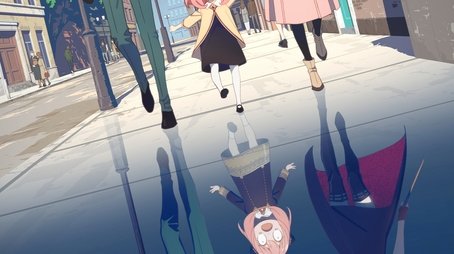
Ask Your Own Question
What is the plot?
The episode begins with Lisa Simpson feeling proud of her accomplishments at Springfield Elementary School, particularly her success in a school project. She is confident in her abilities and enjoys being the top student in her class. However, her sense of security is shattered when a new student, a girl named Alison Taylor, arrives. Alison is not only intelligent but also exceptionally talented, quickly impressing both her classmates and teachers with her skills, particularly in a school project involving a diorama of a volcano.
As Lisa observes Alison's talents, she feels threatened and envious. This jealousy intensifies when Alison wins the attention of their teacher, Mrs. Krabappel, who praises Alison's work and encourages her. Lisa's internal struggle becomes evident as she grapples with her feelings of inadequacy and the fear of losing her status as the best student. She tries to maintain her composure but is visibly upset by Alison's presence.
In an attempt to regain her position, Lisa decides to work harder on her own school project, a diorama of a rainforest. She puts in a significant amount of effort, pouring her heart into the project. However, her determination is met with further challenges as Alison continues to excel, showcasing her own project with ease and charm. Lisa's frustration grows, leading her to make a series of increasingly desperate decisions to outshine Alison.
During a school assembly, Lisa's competitive nature comes to a head when she overhears Alison discussing her project with other students. Feeling the pressure, Lisa sabotages Alison's project by secretly tampering with it, hoping to ensure her own victory. However, this act of sabotage weighs heavily on Lisa's conscience, and she begins to feel guilty about her actions.
As the day of the school project presentation approaches, Lisa's guilt manifests in her behavior. She struggles to focus on her own project, haunted by the thought of what she has done to Alison. Meanwhile, Alison remains blissfully unaware of Lisa's actions, continuing to prepare for her presentation with confidence.
On the day of the presentations, Lisa's project is finally revealed. She presents her rainforest diorama with enthusiasm, but her heart isn't in it as she reflects on her earlier sabotage. When it comes time for Alison to present her volcano project, Lisa is shocked to see that Alison has discovered the tampering and has managed to fix it, presenting it flawlessly. The audience is captivated by Alison's work, and Lisa's heart sinks as she realizes that her efforts to undermine Alison have backfired.
After the presentations, Lisa confronts Alison, admitting to her sabotage and expressing her feelings of jealousy and insecurity. Alison, displaying kindness and understanding, forgives Lisa and encourages her to embrace her own talents rather than compete against others. This moment of vulnerability allows Lisa to reflect on her actions and the importance of friendship over rivalry.
The episode concludes with Lisa learning a valuable lesson about self-acceptance and the value of collaboration over competition. She and Alison form a tentative friendship, and Lisa begins to appreciate her own unique abilities, realizing that she doesn't need to be the best to be valued. The final scenes show Lisa and Alison working together on a new project, symbolizing a shift in Lisa's perspective and a newfound camaraderie.
What is the ending?
In the ending of "Lisa's Rival," Lisa Simpson feels threatened by her new classmate, Alison, who excels in everything and seems to overshadow her. After a series of competitive encounters, Lisa ultimately realizes that her jealousy is unfounded. In a moment of clarity, she decides to embrace her individuality and creativity rather than compete with Alison. The episode concludes with Lisa and Alison sharing a moment of mutual respect, and Lisa finds solace in her own unique talents.
As the episode draws to a close, we see Lisa grappling with her feelings of rivalry and inadequacy. The final scenes unfold as follows:
The climax occurs during the school's annual science fair, where Lisa has worked diligently on her project, a model of the solar system. However, Alison, with her impressive project on the human brain, captures the attention of the judges and her classmates. Lisa's initial excitement turns to anxiety as she watches Alison effortlessly charm everyone around her. The tension builds as Lisa feels overshadowed, her internal struggle evident in her furrowed brow and clenched fists.
In a pivotal moment, Lisa confronts her feelings of jealousy. She watches Alison interact with their classmates, and instead of feeling anger, she begins to understand that Alison's talents do not diminish her own. This realization is visually represented as Lisa's expression shifts from one of frustration to contemplation. The camera captures her deep breath, a sign of her acceptance.
As the science fair progresses, Lisa's project is finally presented. She stands before the judges, her heart racing, but she speaks passionately about her work. The audience is captivated, and for a moment, Lisa feels a sense of pride in her own accomplishments. The juxtaposition of her project against Alison's highlights the theme of individuality versus competition.
In the final moments, the judges announce the winner of the science fair. To Lisa's surprise, they award her the first prize for her creativity and effort. The victory is bittersweet, as she recognizes that her rivalry with Alison was rooted in her own insecurities. Instead of gloating, Lisa approaches Alison and offers her congratulations, acknowledging her impressive work. This act of kindness signifies Lisa's growth and maturity.
The episode concludes with a scene of Lisa and Alison walking together, sharing a moment of camaraderie. They discuss their projects, and Lisa expresses admiration for Alison's intelligence. The camera pans out, showing the two girls laughing together, symbolizing the resolution of their rivalry. Lisa's journey ends with her embracing her unique talents, understanding that competition does not define her worth.
In summary, Lisa learns to appreciate her individuality and the value of friendship over rivalry. The episode closes on a hopeful note, with both girls finding common ground and respect for one another, highlighting the importance of self-acceptance and collaboration.
Is there a post-credit scene?
In the episode "Lisa's Rival" from season 6 of The Simpsons, there is no post-credit scene. The episode concludes without any additional scenes or content after the credits roll. The story wraps up with Lisa coming to terms with her feelings of rivalry and jealousy towards her new classmate, Alison, who excels in various activities, including a science project. The focus remains on the main narrative and character development throughout the episode, leading to a resolution that emphasizes themes of friendship and self-acceptance.
What motivates Lisa to feel threatened by her new classmate, Alison?
Lisa feels threatened by Alison because she is not only academically gifted but also excels in areas where Lisa takes pride, such as music and art. Alison's confidence and talent make Lisa question her own abilities, leading to feelings of jealousy and insecurity.
How does Bart's behavior change when he interacts with Alison?
Initially, Bart is intrigued by Alison's intelligence and charm, which leads him to act more maturely and even help her with her schoolwork. However, as he sees Lisa's distress over Alison, he becomes protective of Lisa, showcasing a more loyal side to his character.
What specific actions does Lisa take to try to outdo Alison?
Lisa attempts to outdo Alison by working harder on her school projects, particularly in a science fair competition. She becomes increasingly competitive, even sabotaging Alison's project in a moment of desperation, which highlights her internal struggle with jealousy.
How does Marge react to Lisa's rivalry with Alison?
Marge tries to be supportive of Lisa, encouraging her to focus on her own strengths rather than comparing herself to Alison. She expresses concern about Lisa's growing obsession with the rivalry, emphasizing the importance of being true to oneself.
What role does the science fair play in the conflict between Lisa and Alison?
The science fair serves as the climax of the rivalry, where both girls showcase their projects. It heightens the tension between them, as Lisa feels the pressure to prove herself and ultimately leads to her decision to sabotage Alison's project, which reflects her internal conflict and desperation.
Is this family friendly?
In "Lisa's Rival," there are a few scenes and themes that may be considered potentially objectionable or upsetting for children or sensitive viewers:
-
Jealousy and Competition: The episode explores themes of jealousy and rivalry, particularly between Lisa and her new classmate, which may resonate with children who have experienced similar feelings.
-
Bullying: There are moments where Lisa feels overshadowed and belittled by her rival, which could be upsetting for viewers who have faced bullying or exclusion.
-
Parental Disappointment: Lisa's internal struggle with her self-worth and the fear of disappointing her family may evoke feelings of sadness or anxiety.
-
Emotional Conflict: The episode delves into complex emotions, such as insecurity and the pressure to succeed, which might be challenging for younger viewers to fully understand.
-
Mature Themes: Some jokes and references may be more suitable for older audiences, as they touch on adult themes that could go over the heads of younger viewers.
Overall, while the episode is comedic and light-hearted, it does address deeper emotional issues that may require parental guidance for younger audiences.











